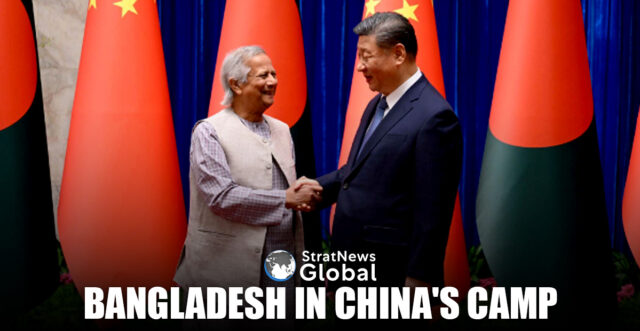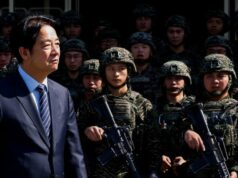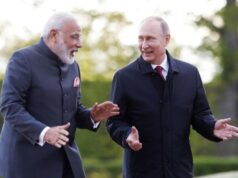Bangladesh has deepened its engagement with China by welcoming Beijing’s participation in key infrastructure projects, including the Teesta River project, a special economic zone in Chittagong, and the Mongla Port expansion.
Discussions also covered the potential acquisition of Chinese fighter jets, alongside Dhaka’s endorsement of President Xi Jinping’s global initiatives.
Bangladesh In China’s Camp
This marks Bangladesh’s significant shift towards Beijing during the tenure of Chief Adviser Muhammad Yunus.
Muhammad Yunus, leading Bangladesh’s interim government since Sheikh Hasina’s ouster last year, completed a four-day visit to China—his first bilateral foreign trip as chief adviser.
On March 28, he met Chinese President Xi Jinping at the Great Hall of the People in Beijing, where they discussed China’s support for various infrastructure initiatives and connectivity projects linking Kunming to Bangladeshi ports.
The visit resulted in the signing of nine agreements, including those related to economic and technical cooperation.
Yunus Sought India Visit
Before his China visit, Yunus’s media advisor, Shafiqul Alam, told The Hindu that Yunus had initially sought to visit India, but there was no response from New Delhi.
His China trip, with its key takeaways, comes ahead of the BIMSTEC summit in Thailand, where he will share the platform with Indian Prime Minister Narendra Modi.
Bangladesh had officially requested a meeting between Yunus and Modi on the sidelines of the BIMSTEC summit, but India has not confirmed any such engagement.
While a formal meeting appears unlikely, it may be difficult for Modi to completely avoid informal interactions with Yunus during the limited-circle summit.
India-Bangladesh Tensions
Tensions between India and Bangladesh have persisted since August 2024, with Dhaka expressing dissatisfaction over what it perceives as exaggerated claims from New Delhi regarding attacks on minorities, particularly Hindus.
Many in Bangladesh’s political sphere believe that India played a role in sustaining Hasina’s prolonged rule without credible elections.
The last visit by a Bangladeshi leader to China was Hasina’s in July 2024, shortly before student-led protests forced her to leave office and seek refuge in India.
Hasina Era
While Hasina was generally seen as pro-India, she also maintained close ties with Beijing, particularly in defense cooperation.
A comparison of the joint statements from Hasina’s and Yunus’s visits reveals key differences in policy direction.
A notable shift in the 2025 joint statement is Bangladesh’s explicit welcome of China’s participation in the Teesta River Comprehensive Management and Restoration Project (TRCMRP).
During Hasina’s last visit to Delhi in June 2024, India had announced plans to send a technical team to Bangladesh to assess the Teesta project, aiming to counter China’s interest.
Teesta Project
The project, estimated at $1 billion, includes building a reservoir, deepening the riverbed, and constructing embankments and satellite cities.
Bangladesh had initially sought a $725 million loan from China, but Beijing hesitated over financial viability concerns.
India has opposed Chinese involvement, viewing it as a strategic move to expand Beijing’s influence in Bangladesh, where Chinese firms already handle major infrastructure projects.
After her 2024 China visit, Hasina had stated that although Beijing was willing to undertake the Teesta project in Bangladesh, she preferred India to execute it.
However, in February 2025, Bangladesh’s interim environment adviser, Syed Rizwana Hasan, announced an extension of the deadline for China’s Power Construction Corporation to complete the project’s master plan by 2026, with an initial draft expected by the end of 2024.
Water Resource Management
Water resource management was a priority for Yunus, as he requested China’s assistance in formulating a 50-year master plan for Bangladesh’s rivers.
Additionally, both nations agreed to initiate a new round of maritime cooperation discussions.
The joint statement emphasised collaboration in hydrological forecasting, flood control, disaster mitigation, river dredging, and technology sharing.
Bangladesh-China MoU
Bangladesh and China also signed an Implementation Plan under the MoU on Hydrological Information Exchange for the Yarlung Zangbo-Jamuna River, a significant step considering China’s plans for a mega dam on the Yarlung Zangbo in Tibet.
Bangladesh also invited China to participate in the Mongla Port modernisation project and the Chinese Economic and Industrial Zone (CEIZ) in Chittagong.
According to Yunus’s official Facebook page, Bangladesh secured $2.1 billion in Chinese investments, loans, and grants for various projects, including $400 million for Mongla Port, $350 million for the CEIZ, and $150 million for technical assistance.
Additionally, nearly 30 Chinese firms have committed $1 billion in investments in CEIZ.
China Eyes Key Bangladeshi Port
China had been eyeing the Mongla port project for years, but progress had been slow.
The new proposal for a Chinese-led SEZ in Chattogram is a fresh development, though it remains uncertain whether the interim government can navigate the complexities of land acquisition within its limited tenure.
India had also agreed to develop an SEZ at Mongla through a government-to-government deal in 2015, but the project never materialized. Likewise, Adani was selected to develop an SEZ in Chattogram in 2019, but it appears to have been abandoned.
Bangladesh and China stressed the need to begin negotiations for a free trade agreement, an idea that had been previously considered under Hasina’s administration.
Bangladesh Backs China
On China’s key geopolitical concerns, Bangladesh showed stronger support than before. While the One-China policy was reaffirmed in both 2024 and 2025, the latest joint statement explicitly opposes “Taiwan independence.”
The March 2025 joint statement also features a more robust endorsement of China’s global initiatives.
Unlike the 2024 statement, which merely acknowledged discussions, the new statement explicitly highlights Bangladesh’s appreciation for the Global Development Initiative (GDI) and recognizes the significance of the Global Security Initiative (GSI) and Global Civilization Initiative (GCI).
During Hasina’s tenure, China refrained from commenting on Bangladesh’s internal governance.
This time, however, the joint statement explicitly voices Beijing’s support for the interim government in “effectively exercising governance, maintaining unity and stability, and steering Bangladesh toward development and prosperity.”
50 Years Of Diplomatic Ties
As Bangladesh and China mark 50 years of diplomatic ties, 2025 has been designated as the “Year of China-Bangladesh People-to-People Exchanges.”
Additionally, China pledged support for Bangladeshi patients seeking medical treatment in Yunnan Province, especially as India has scaled down visa operations due to security concerns.
To enhance healthcare collaboration, China also announced plans to establish a robot-assisted physiotherapy and rehabilitation center in Bangladesh.





